Monday, August 31, 2009
Identification Document
Most of the 39 pages in the book has been stamped or has visa stickers in them. In the past couple of years, I have spent long hours on the net, filling out visa forms, and at embassies queuing for visa approvals - Vietnam, Maldives, Malaysia, Australia, UK, US, South Africa, South Korea, etc. And yesterday evening, it was the first time I had to get visa at the airport, and I knew that if the immigration officer didn't approve, my 6 months of preparations to Kenya would be down the drain.
At the Kenyan International Airport, I waited anxiously for the officer to look through my passport. They brought that little red book, from counter to counter, typing into their computer screens, speaking to each other in Swahili, a language I will be learning in a couple of weeks, granted the visa gets approved.
I did a brief run through of the Plan B senario, in case the visa was not approved. (I have been denied of admission to Malaysia twice before). If I wasn't here in the hostel where the 23 students are accomodated for the orientation, I would probably be on the plane to Singapore. I counted the number of days to school reopening: about 14 days. That would give me enough time to buy a ticket, send emails out to the administration and professors to let me into classes, because the semester abroad didn't go through.
Thankfully, I didn't have to explore plan B further. I got a 3 month visa in the country and I am now on my way to learning Kenya, its socieity and the trajectory of development work here.
But at times, I wonder if it would be a good choice, if I had tried to get a citizenship of another country. Frankly speaking though, I am not really a citizen of Burma/Myanmar. I have a foreign identification there, because my mom was born to Chinese immigrants in the country is not granted a Burmese nationality. So I am a phu (foreign born) in Burma, a permanent resident in Singapore, and a person with a student visa in the US; in other words... a stateless citizen?
Saturday, August 29, 2009
Egoli
NOnetheless, I had a great time there, walking in the CBD and through the trainstation and Taxi rack that is supposedly a no-go area. (I probably won't have done it alone. I was accompanied by 3 others, Angie and 2 guys- one from Ireland and the other from Germany whose company made the trip a lot more enjoyable). There were also the conversations we had with Taxi drivers (They express their political views more openly than those did in Cape Town). And the dinner with mand and a Carleton alum: Kgomotso, who is just full of energy!

Thursday, August 27, 2009
The last 40 hours has been a test of patience.
It started with a 27 hour train ride from Cape Town to Johannesburg that turn out to be 2 hours longer.. Although this formed the bulk of the long journey, i enjoyed the time on the train very much; nice sleeping cabin, a restaurant and a bar, and the beautiful sights of the South african landscape (I will write a separate entry about this sometime). but once we get to joburg, a city famous for its fast-pace lifestyle (as cape towners put it), has been a series of uncertain arrangements and time spent waiting.
I now write this from a COMPAQ DESKPRO computer at my hostel, which has a two second delay before each word appears on screen. At this point, i have typed a full sentence, and there would be about half a minute wait before the sentence appears. i guess this doesn't only trains up my patience but also makes me a multitasker, for i have spent the waiting time, patiently nibbling on crackers, which has been the source of my energy for the past 2days.
6 hours ago, we arrived at the Joburg station, looking forward to a good hot shower and the array of facilities it boasts in the bagpackers guidebook- pickup serive, tennis court, pool, homecooked meals at the restaurant, a bar and pool table. angie and i craved for a nice warm meal, after not having eaten a proper meal for 2 days but decided to hold of food while waiting for the waiting for the pickup. it was a test of our determination, because the pickup venue was at a restaurant which served burgers and milkshakes, and not having eaten a proper meal in 2 days, we were very tempted. but we were patient. we waited for 2 hours for the taxi driver patiently, only to receive a call that asked us to get a taxi to the location, because of the bad traffic.
So we left the station, at 6.30pm, in the dark, looking for the taxi place, with my big bagpack, a yellow tote bag full of the supply of cracker, now lighter after we consumed most of it on the train, and my black rolling suitcase. as luck would have it, the taxi driver didn't know where the hostel was. he had a map and i looked the index of streets. the street name wasn't there. i was confused, because the hostel location was supposed to have a nightlife and restaurants nearby. the driver made two stops to ask the people on the roads, and finally drove down a long, deserted road; the only things that were in motion on the roads were the raindrops splattering onto the ground and the movement of the wipers.
it was disappointing to find that the location of the hostel was not what we had expected. and it made me even more impatient that the manager seemed not to care at all about our arrival (we had to ask another resident to find him and it took about 10 minutes before he came), about where we are sleeping and what we could do in joburg. We asked about the restaurant/homecooked dinner and got the reply that we had to make it ourselves (which means we had to get the groceries, an option that is impossible when there is not a single grocery store in its 5km radius). he gave us a delivery menu, which had 3 restaurant options. the first one we picked was out because they don't do take outs, the second out because we were 15 minutes late of the last time they deliver, the third was pizzas, which didn't appeal to us at all, after having junk food for 2 days.
And so, I am now patiently typing this entry, with the last piece of cracker by the keyboard, soon to become the last thing i eat, probably in the next 12 hours.
----------------------------------------------------------------------------
Although the trip has been a long string of waiting and unexpected incidences, i am not pissed off by these as i would have been, if this happened 3 years ago. i will probably laugh about it in the retrospect. At least angie is here with me and if we meet at all, in scotland again, i am sure we can get a few good jokes out of this trip!
Journey of Reminiscence
Over the course of the train ride, I had conversations with Angie about how we had spent our childhood. I had listened to the songs on my IPOD, and looked at my family photo. When the train stopped at stations, which it did ever frequently, I wrote some postcards to friends at Carleton, and I was reminded of the good times I had in the small college in Northfield.
The rural landscape of the Western Cape, the Orange Free State and Guteng made me feel as if I were transported back in time... It was spectular:





Monday, August 24, 2009
Cape Point
Saturday, August 22, 2009
Shine Literacy Program
Shine is a non-profit organization i volunteered with, for the past 6 months. the agency, run completely by volunteers (with the exception of 1 paid administrative staff) has grown and flourished in the years since it has been founded. And now, it has centers that work on improving the lanuguage skills of weak grade 2 children in 4 schools.
The fabric of this organization seem to be that of human relationships, be it volunteer-child, volunteer-volunteer or volunteer-organizer. it is definitely a H-A-P-P-Y place to be at.
the centre that i volunteered at, zonnebloem primary school is a place of social gathering for volunteers (a majority of whom are women in the 40s and 50s), where they happily chat away before sessions start. And the good spirit is transfered to the kids during the teaching times, and this makes the shine center programs a time that children look forward to coming. (there were a couple of kids who sneaked in to read with us, although they are not on the list of children who needed help with english language).
This is the scene i look forward to everytime i go to the center; the sight of children running up the small hill to the center, with books they had borrowed the week before in their hands. when they finished their little race up the hill to the center, they are reward by the smiles and hugs that the volunteers shower them with.

the next hour of learning is not the conventional learning. instead, shine uses resources such as games, puzzles and volunter-children relationships to encourage children to develop a love for reading and equipping them with the skills to do so. the above picture is that of a kid learning to make up a sentence with the items that is in the puzzle he just put together.
the energy level of the volunteers are encourage to be kept high, so that the children enjoy the activities conducted.

At the end of the hour long session, the children each receive a 'praise card" which the volunteers writes to explain how well they have done. this not only boosts the kids' self-esteem but also makes them want to learn to read these words by themselves.
for children that are not in the program, they could make use of the "Swap Shop," or an informal library system that allows them to take home a book each weekend.
Tuesday, August 18, 2009
At the count of 3, I want you to put your hands on...
That was one of the ways we (the team of educators at Think Twice) engage the youths to talk about sexuality, relationship and marriage. Think Twice has a program that lasts for 6 weeks, engaging to 15 year old students about these issues.
In South Africa, where single parenting and teenage pregnancies are common, the efforts of organizations like Think Twice becomes increasingly important. Surprisingly, I find the youths here engaged, and eager to learn about these issues. And some of them, I must say, are very sensible. There was a boy who asked about HIV testing, one who was mature enough to discuss promiscuity and many, who voiced their views against premarital sex.
In the past 4 weeks that I had been assisting to teach the lessons, I have learnt many lessons myself. Think Twice is careful in making sure that the lessons are not dictative for the kids; instead of preaching abstainance, the lessons are designed to present the consequences of having premarital and casual sex. I also find the structure of the lessons interactive, with games, discussions and exercises.
One example is the "biggest sexual organ" exercises, where the instructor asks the kids to put their hands on what they think is their biggest sexual organ, while the instructor places hands on head, pointing out that sex starts in your head. Of course this exercise is greeted with uncomfortable and shy giggles, but it also makes the kids remember and start thinking...
And in some sense, being one of the presenters, I found myself thinking about the issues presented, and learning from my colleagues. My colleague, Moussa, is extremely skilled at presenting difficult ideas and values across, without making it sound dictative.
Standing in front of the class and teaching, it builds up public speaking skills and guage the audience's attentiveness and find ways engage them, if I found that they are drifting off... My colleague, Juliet is especially good at this, and her sense of humor helps a lot as well.
From the kids, I learnt how it was like to be an inquisitive, and the value of questioning, and learning, and also, having someone as a guide to talk about the issues that were considered "taboo". Watching them, I am also reminded of myself, when I was in Singapore, and I cannot help but compare the education systems of Sg, Burma and US to South Africa (possibly another post).
Even the 6am alarm clock calls and going to work in the squished mimi-taxi (there are usually 22 passangers on board, when the max number should have been 13-15) before the sunrise with Angie has become an activity I enjoy.
It is for all these reasons that I will miss working with Think Twice, when I leave Cape Town next Wednesday. But I am sure that if I ever come back to this city, Think Twice would have done several impactful lessons, engaging the lives of many young South Africans, and it is indeed, a privilege to have worked with such an organization!
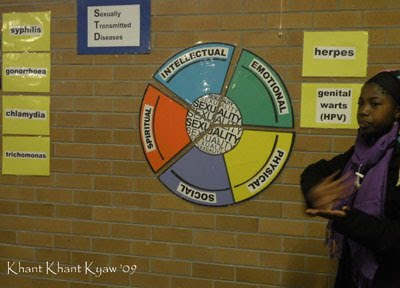 My colleague, Juliet expaining the different STDs, and the wheel of sexuality to the kids.
My colleague, Juliet expaining the different STDs, and the wheel of sexuality to the kids. The children, putting their hands in the air, before doing the biggest organ exercise.
The children, putting their hands in the air, before doing the biggest organ exercise. My colleagues who I would dearly miss. From the back:
My colleagues who I would dearly miss. From the back:Moussa, the father figure, from Congo
Angie, my travelmate, from UK
Juliet, a Cape Townian, with a great sense of humor
and me.
Friday, August 14, 2009
Would you leave all that you have behind, because you were treated too well?
She is a white South African who has lived in the states for 40 years. Many of the whites here have connections/families overseas, but for this women, she knew no one when she left for the states at the age of 17. That was nothing extraordinary, but her reason for leaving was. She left her home, her family and her life here, because she thought she was in such a position of privilege during the apartheid years. She couldn't stand the way the coloured and blacks were considered second and third class citizens. She couldn't stand being in areas where it was off-access to the other races.
And so, she packed her bags and left for a New York City. She didn't know anyone there, and during that time (1970s), there wasn't internet/phones to keep in touch with her family. To go through that, just because you were treated too well? I thought that was a very brave decision for her to make, and I am inspired by the humanity and conscience she has in her!
Wednesday, August 12, 2009
4 seasons in a day.
That is probably why a lot of people has been falling sick. I was no exception. For the past 4 days, I had been watching sunrise and sunsets, lying under the comforters in my bed. I don't get sick easily, so when I do, I feel miserable. And I had really wanted to recover, so I slept from Saturday night until Monday morning, only waking up for breakfast and a bland dinner of boiled rice and cabbage ( I felt too weak to cook anything). I went to work on Tuesday, thinking I had recovered, but I was wrong. The classroom was in a cold dark container and I started coughing again. I don't know how the students in the High School are able to handle such cold environment... But I was shivering for a couple of hours even when I returned home.
And during these times when I can't be out doing things, and when my mind is left to wander, I miss home. I am sorry you have to read this ranting, but I guess a little complaining goes a long way, especially when I have another 20 weeks before returning home for 3.
In the time that I took to type this entry, the sky has turned from light blue to overcast. I think it would start another cycle of pouring.
Thursday, August 6, 2009
Housing in South Africa- Gugulethu
Of course one cannot collapse the many racial diversities into one group of "South Africans," but I was shocked, when I visited this township, called Gugu Lethu, home for Xhosa people.
 The entire residential area was filled with structures like the ones in this photograph. Their houses, or "shacks" as they are called, are built with the bare mininum materials- tin sheets. Each shack is built so close to another, that at some points, I had to walk sideways to get through the path.
The entire residential area was filled with structures like the ones in this photograph. Their houses, or "shacks" as they are called, are built with the bare mininum materials- tin sheets. Each shack is built so close to another, that at some points, I had to walk sideways to get through the path.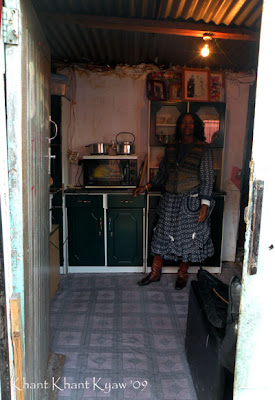 Each shack is no bigger than 4 by 2 meters and has a bed which is also used as a sofa for guests, a dressing table, a small television) a stove and a fridge (if the residents could afford).
Each shack is no bigger than 4 by 2 meters and has a bed which is also used as a sofa for guests, a dressing table, a small television) a stove and a fridge (if the residents could afford).This is a photo of Lulekwa's mom. (Lulekwa is the lady I met on the way back from eastern cape and she lives in the shack across from her mom with her 17 year old son and a 13 year old daughter).
 The people in the Townships basically share almost all ammenities. They use public toilets like the blue ones in this photo. As for electricity, one has to buy the wires to connect the electricity main to their shacks at the risk of being stolen along the way.
The people in the Townships basically share almost all ammenities. They use public toilets like the blue ones in this photo. As for electricity, one has to buy the wires to connect the electricity main to their shacks at the risk of being stolen along the way. Even water is shared through a communal tap. The taps are spread out, one on each road. I was told that there are times when water supply gets cut off, and so the residents are left without any water to cook or clean. However, on rainy days, they get an unwated supply of water rushing into their homes, leaving their belongings flooded.
Even water is shared through a communal tap. The taps are spread out, one on each road. I was told that there are times when water supply gets cut off, and so the residents are left without any water to cook or clean. However, on rainy days, they get an unwated supply of water rushing into their homes, leaving their belongings flooded. Needless to say, people in these townships live in dire poverty. And as a result, crimes like robbery, theft and rape are not uncommon.
Needless to say, people in these townships live in dire poverty. And as a result, crimes like robbery, theft and rape are not uncommon. I thought this was an interesting picture to potray how the family structures in South African black communities are. Children make up about 50% of the population in the township, and they are all living with their mothers, who are living with their ... boyfriends. A stable married family is often the exception, in places like the township. This could point out the link between, income and education on life decisions.
I thought this was an interesting picture to potray how the family structures in South African black communities are. Children make up about 50% of the population in the township, and they are all living with their mothers, who are living with their ... boyfriends. A stable married family is often the exception, in places like the township. This could point out the link between, income and education on life decisions. And most of these single moms fell pregnant before they finish their high school education. They often dont have enough money/nutrition information to raise their children on a proper diet.This picture above is one of a convenient store in the township. It has tomatoes and cabbages, and potato chips. These food items make up their diets.
And most of these single moms fell pregnant before they finish their high school education. They often dont have enough money/nutrition information to raise their children on a proper diet.This picture above is one of a convenient store in the township. It has tomatoes and cabbages, and potato chips. These food items make up their diets.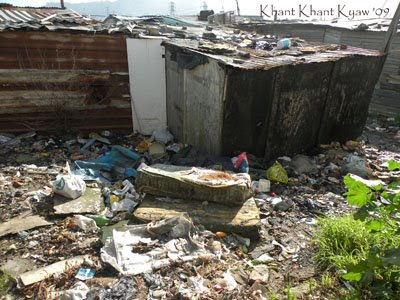
To me, it is a puzzle to how the government of South Africa could pump in millions of dollars into construction of shopping malls, development of 2010 facilities and even the battle against AIDS. Granted that the fight against such infectious disease is not an easy victory, and it has to come with much effort on all fronts, espcieally in a country such as South Africa, where one in 4 adults are infected. But unless housing and sanitation conditions for the people here are improved, it is going to be a futile effort battle AIDS, or TB, or even provide children with the education and a healthy childhood they deserve.
I spoke about this with a friend and she has told me that it has been a difficult effort to relocate the blacks here, because they have had a difficult history of being forcefully relocated in the past. But I don't think that is a good enough reason to stop giving people the most basic ammenities each person deserves, especially in a city like cape town that has much disposable wealth!

Monday, August 3, 2009
Lions Head
It took us about 40 minutes to climb it. The hike was just breathtaking... Take a look for yourselves:
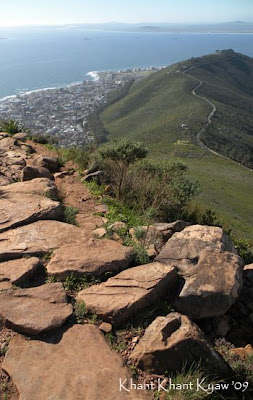 The path up:
The path up:It started with a gradual path, but then as it gets higher, it gets rockier, and just before we reach the summit, we were almost rock climbing!
 The hiking route winds around the little hill and we got to see a 360 degree view of the town.
The hiking route winds around the little hill and we got to see a 360 degree view of the town.I guess this is when efforts for trying pays off; even if hikers don't get to the top, the journey itself is rewarding.
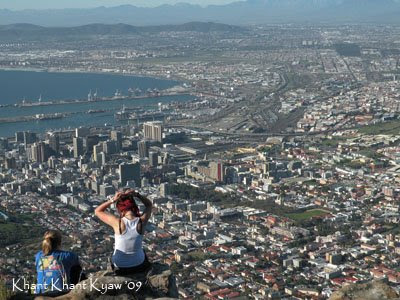 But it is just fantastic when we get to the top.
But it is just fantastic when we get to the top. We (literally) chilled out for about 2 hours at the summit, waiting for the sunset view before making our way down.
We (literally) chilled out for about 2 hours at the summit, waiting for the sunset view before making our way down. Going down was more challening.
Going down was more challening.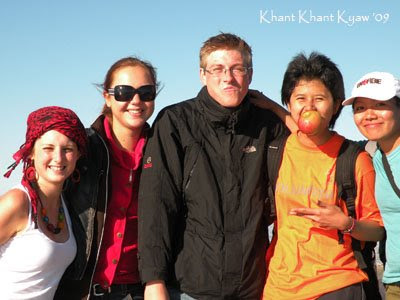 Part of the hike team: Angie, Lara, Lenard, Me and Prakriti
Part of the hike team: Angie, Lara, Lenard, Me and Prakriti







